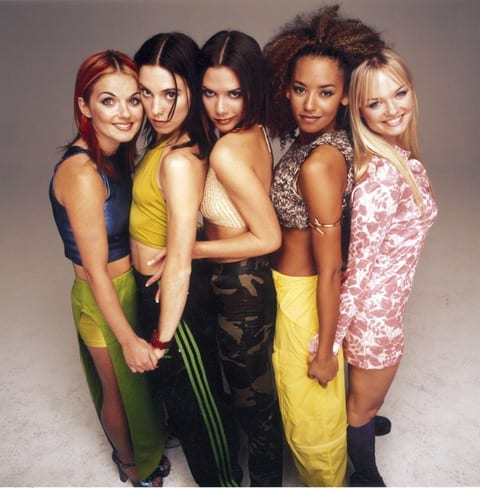The New York Observer; 1997
The Spice Girls Are Coming! The Spice Girls Are Coming!
Last July, the Spice Girls, Britain’s all-girl pop juggernaut, was loosed upon the world. Since then, their mindlessly catchy single, “Wannabe,” has zoomed straight to the top of the pop charts in 35 countries (including Estonia and Latvia). That was followed closely by their second and third singles. “Wannabe” became the most requested video on the Box in Britain for three months and the Spice Girls’ debut album, Spice (Virgin), started to shift units in a massive way; to date, roughly 3 million copies have been sold worldwide. How did this happen?
Simple: By writing their own feather-light but sickeningly addictive songs, creating their own Spice Channel-meets-Contempo Casuals look (Flares! Pigtails! Thigh-high fuck-me boots!) and mouthing off about sex, the Spice Girls became the first girl group in Britain to appeal mainly to girls. That was a stroke of genius. Who else do you think spends their allowance on all those singles? Now, having conquered the rest of the world, and raked in about $15 million with which to buy more lick-on tattoos in the process, the Spice Girls are packing up their hip-huggers and heading this way.
My first response was denial. Europeans always go in for that pop fluff. These are, after all, people raised on the Eurovision song contest. But we Americans wouldn’t be fooled. We like our Snoop Doggy Doggs and our Smashing Pumpkins. Ace of Base? Well, that was four years ago–and anyway, they were Swedes. New Kids on the Block? Ten years ago. Spice Girls? Please.
Six months later, they are everywhere, and I am on the verge of a nervous breakdown. “Wannabe” entered the Billboard pop chart at No. 11 on Jan. 26 and climbed to No. 2 within weeks. Spice shipped gold (500,000 copies) to the United States on Feb. 4. Radio and MTV have gone on a Spice Girls bender: heavy rotation on MTV and 55 to 60 spins a week on “Z-100,” WHTZ-FM in New York. Every time Mel B.’s opening yelp–“Yo, I’ll tell you what I want, what I really, really want”—comes over the radio, I suffer a sort of fit.
But then a funny thing happened. The song’s daffy charm began to insinuate itself into my head in that unstoppable oh-Mickey-you’re-so-fine-you’re-so-fine-you-blow-my-mind kind of way. Perhaps it was just the mind-numbing repetition, or the uncomplicated lyrical sentiment that girlfriends rule, and if you boys can’t “get with my friends,” then you can just go without sex for a while.
Whatever it was, the “Wannabe” video clinched it. Spectacularly bad, the clip looks like it was made for about $5 and features Mel B., Mel C., Emma, Victoria and Geri (my personal fave, clomping around in five-inch heels and what looks like a circus ringleader costume) doing a bit of overenthusiastic lip-synching. Watching them, it becomes clear that the teenage girls of the world have clasped this quintet to their collective training bra because these chicks could be them. Unlike the statuettes in En Vogue or the stylized bad girls of T.L.C., their confident girlie stance, above-average girl-next-door looks and fit bods aren’t overwhelming or out of reach. Of course, it is easy to imagine one of the Spice Girls taking a cue from T.L.C. member Left Eye and torching a cheating boyfriend’s house, but they’re more likely to be found doling out sex tips.
Are Spice Girls, as one nonbeliever moaned in America Online’s music industry dirt folder, the Velvet Rope, “the end of civilization” as we know it?
The Girls formed a few years ago when the five actress-singer-dancer-model wannabes separately answered an ad put in a trade paper by a wannabe Svengali manager in search of girls to form a female equivalent to Take That, the best-selling British teen boy group. Apparently, they knew each other slightly from the audition circuit; as Victoria Adams told The Face, “We were always the crap ones left behind.” The official story is that when the girls realized that they knew how to reach their natural audience better than Svengali Man, they booted him, moved into a house together and began writing their own material. Soon they were performing a cappella for anyone who would listen.
So, meet the crap ones left behind: Emma Bunton, the baby of the group with the blond sprouts growing out of her head; Melanie Chisholm, the soccer-mad athlete from Liverpool; Melanie Brown, the frizzy-haired loudmouth with the pierced tongue and the voice; Geri Halliwell, the good-natured klutzy redhead and former topless model; and Victoria Adams, the one who makes a practice of looking grim for the camera and who doesn’t seem to know how to sing at all.
Those cartoonish personalities have served the Spice Girls well, just as it did the Village People back in the 70’s. Fans debate over their favorite Spice: “Baby,” “Sporty,” “Scary,” “Ginger” or “Posh,” as they are often referred to in the British tabloids, which have set upon them like a pack of wolves. First, there were the topless photos of Geri; then, the alleged coke habit of fitness freak Mel C.; then the sniping about how “worryingly ordinary” (read: fat) Emma looked in a bathing suit; the general uproar caused by their endorsement of the Conservative Party; and lastly, a Daily Mail account of teetotaler Victoria getting so drunk (“paralytic” was the exact term) after celebrating the group’s signing with Virgin Records that she threw her underpants out the window of a taxi.
It’s not unusual for pop stars to be the subject of intense media scrutiny. But what’s unusual about Spice Girls is that there was little pre-album-release buzz in Europe or America. The media frenzy has come after “Wannabe” shot to the top of the charts, followed by their other No. 1 singles, “Say You’ll Be There” and “2 Become 1.” For once, the success was not the result of publicity hype but a bona fide score with the public.
Even in America, “Wannabe” is an instant smash. Spice Girl defenders will tell you that it’s because there hasn’t been an entertaining white pop record like this to fall upon American ears in ages (see Toni Basil). In Britain, where white pop dominates the charts, Spice Girls are a reaction to the trained-seal mentality of pasty-faced yob groups such as Boyzone, Take That, and East 17, not to mention laddish guitar bands such as Oasis and Black Grape.
Mind you, the Spice Girls have engaged in their own juvenile antics: public streaking in the Four Seasons in Los Angeles and sending five blow-up dolls to their official Virgin contract-signing ceremony. Their motto is “Girl Power,” which apparently means more than the freedom to wear acrylic tips and hang with your Barbies. “Our philosophy is New Age feminism spiced up and revitalized for the 90’s,” Geri has chirped. “You have a brain, a voice and an opinion. Never be afraid to express yourself to the max.”
Uh, O.K. But what about the music? Much has been made of the fact that they write their own songs. Victoria, Geri and Mel B. admit to being able to play instruments, but badly. They “write” by singing the melodies to their two production teams. It’s standard pop-soul stuff, borrowing heavily from Madonna (“Who Do You Think You Are?”), Mary Jane Girls (“Last Time Lover”) and even Coolio (“Naked”). The best track is the second single, “Say You’ll Be There,” which has the funk strut of Cameo and Parliament down. And “Love Thing” seems to exemplify the Spice Girl philosophy: Girls rule and boys are useful mainly for sex; they “don’t want to know about that love thing … God help the mister that comes between me and my sisters.” You won’t hear that from most female, boy-centric pop singers.
Pop music is ephemeral by design; groups should strike quickly and brilliantly, then quietly disappear. So by next year, the Spice Girls will either have pulled an En Vogue (upgraded their look and started turning out tasteful, sleek pop-R&B records) or, more likely, Mel B. will go solo and the rest will get parts on highly rated British soaps. The last group to have three No. 1 singles top the British charts was Frankie Goes to Hollywood. Enough said.


